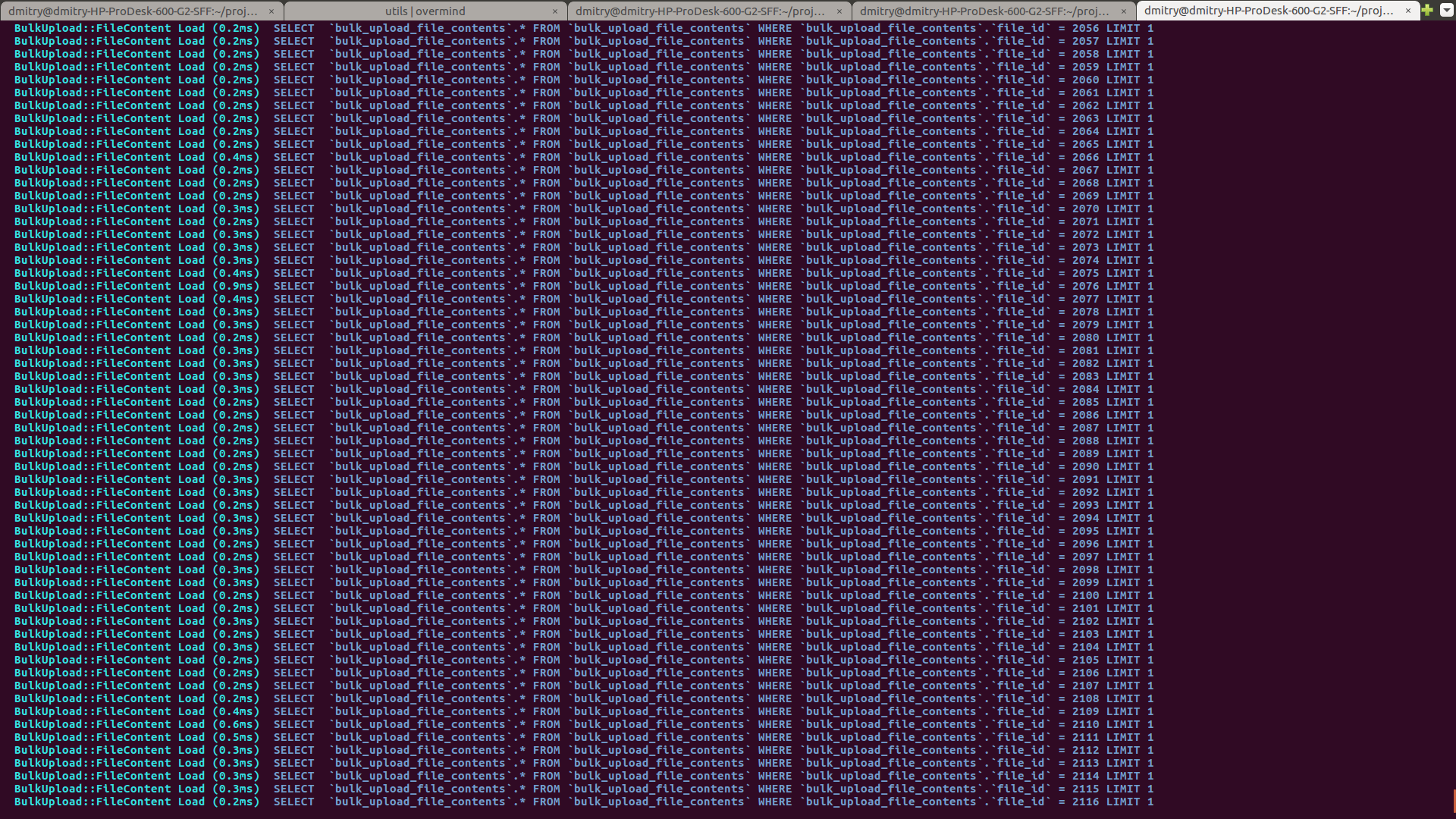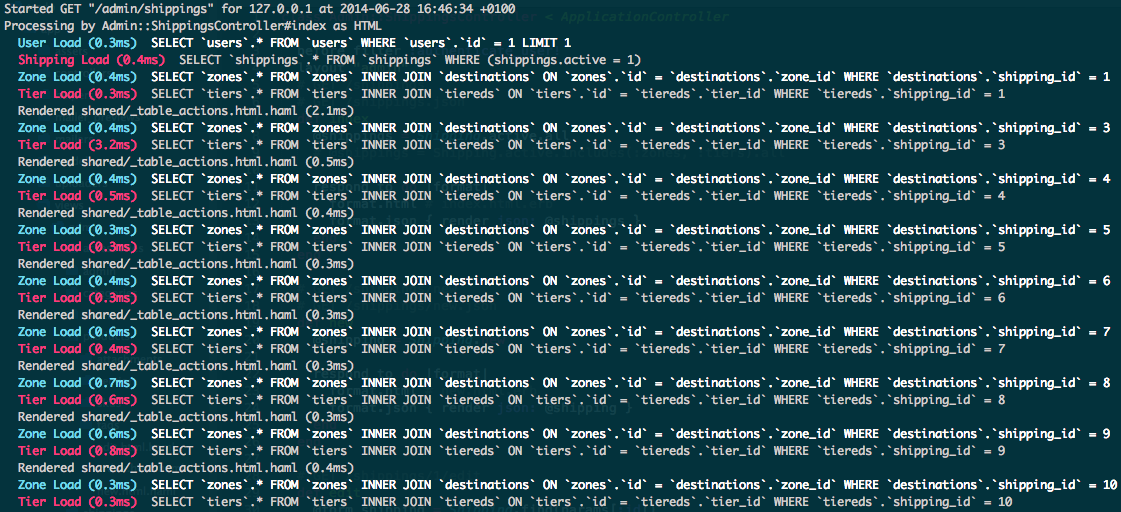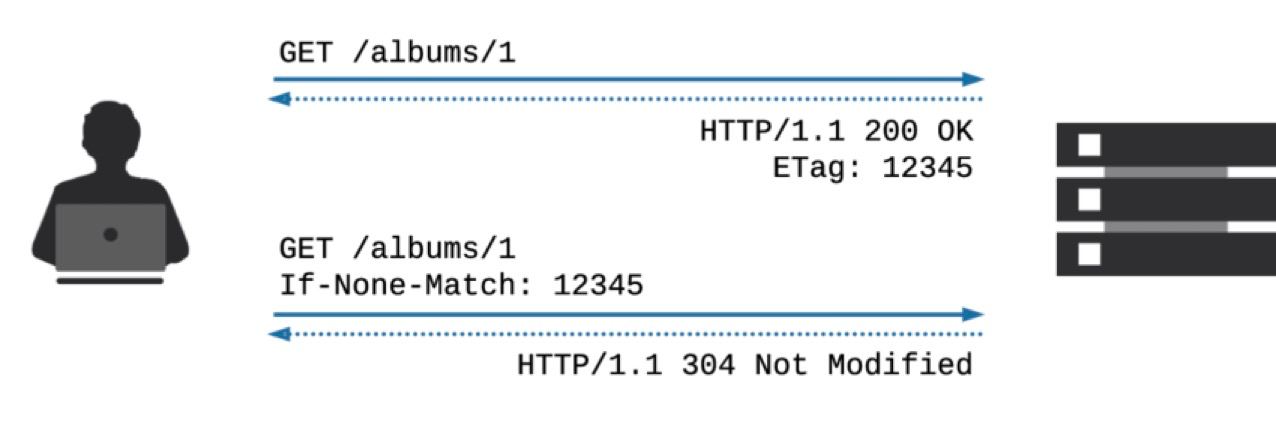Performance practices
Disclaimer: Below is a draft containing a list of practices I shared with less experienced devs in 2018/2019

There’s a specific set of practices that will help you eliminate most performance problems
Agenda
Part 1: practices
- Pagination
- Avoiding N+1
- Caching (service level, request level, Redis, conditional Get)
- Avoiding stupid logic problems
- Preliminary work (aggregating some data to DB, pre-filling cache)
- Dealing with Too long DB queries (e.g. Use index, Luke!)
Part 2: general tips
- how to catch performance problems on the spot
- when to optimize
- flamegraph
1. Pagination

2 Avoiding N+1 requests
Problem:
clients = Client.limit(10)
clients.each do |client|
puts client.address.postcode
end
-> 11 requests:
SELECT * FROM clients LIMIT 10;
SELECT addresses.* FROM addresses WHERE (addresses.client_id = 1);
SELECT addresses.* FROM addresses WHERE (addresses.client_id = 2);
SELECT addresses.* FROM addresses WHERE (addresses.client_id = 3);
SELECT addresses.* FROM addresses WHERE (addresses.client_id = 4);
SELECT addresses.* FROM addresses WHERE (addresses.client_id = 5);
SELECT addresses.* FROM addresses WHERE (addresses.client_id = 6);
SELECT addresses.* FROM addresses WHERE (addresses.client_id = 7);
SELECT addresses.* FROM addresses WHERE (addresses.client_id = 8);
SELECT addresses.* FROM addresses WHERE (addresses.client_id = 9);
SELECT addresses.* FROM addresses WHERE (addresses.client_id = 10);
It doesn’t seem scary…
but with time, you end with:
hash = {}
BulkUpload::File.all.each do |f|
hash[f.id] = f.file_content.content.length
end
=>

Solution:
clients = Client.includes(:address).limit(10)
clients.each do |client|
puts client.address.postcode
end
-> 2 requests:
SELECT * FROM clients LIMIT 10;
SELECT addresses.* FROM addresses
WHERE (addresses.client_id IN (1,2,3,4,5,6,7,8,9,10));
Result:
 (it’s not all the page)
(it’s not all the page)

after fix:


How to not forget:
For ruby : Bullet
configuration:
config.after_initialize do
Bullet.enable = true
Bullet.sentry = true
Bullet.alert = true
Bullet.bullet_logger = true
Bullet.console = true
Bullet.growl = true
Bullet.xmpp = { :account => 'bullets_account@jabber.org',
:password => 'bullets_password_for_jabber',
:receiver => 'your_account@jabber.org',
:show_online_status => true }
Bullet.rails_logger = true
Bullet.honeybadger = true
Bullet.bugsnag = true
Bullet.airbrake = true
Bullet.rollbar = true
Bullet.add_footer = true
Bullet.stacktrace_includes = [ 'your_gem', 'your_middleware' ]
Bullet.stacktrace_excludes = [ 'their_gem', 'their_middleware', ['my_file.rb', 'my_method'], ['my_file.rb', 16..20] ]
Bullet.slack = { webhook_url: 'http://some.slack.url', channel: '#default', username: 'notifier' }
end
!!! I’m sure something similar is already implemented for your language
3 Caching
3.1 Simple caching service, memoisation
Problem:
def fibonacci(n)
n <= 1 ? n : fibonacci( n - 1 ) + fibonacci( n - 2 )
end
(0..10).map {|n| fibonacci(n)} # executes almost instantly
(0..40).map {|n| fibonacci(n)} # takes 26 seconds
(Yes, it’s slow Ruby, but it will hang on every lang with big number)
Solution:
class FibonacciCaching
attr_reader :cached_values
def initialize
@cached_values = { 0 => 0, 1 => 1 }
end
def get(n)
return cached_values[n] if n < 2
cached_values[n] ||= get(n-1) + get(n-2)
end
end
results:
require 'benchmark'
max = 40
Benchmark.bm do |x|
x.report { (0..max).map {|n| fibonacci(n)} }
x.report { fc = FibonacciCaching.new; (0..max).map {|n| fc.get(n)} }
x.report { fc = FibonacciCaching.new; (0..50000).map {|n| fc.get(n)} }
end
# user system total real
# 26.400000 0.000000 26.400000 ( 26.405840)
# 0.000000 0.000000 0.000000 ( 0.000052)
# 0.140000 0.020000 0.160000 ( 0.166776)
3.2 Caching something for the whole request
for ruby: request_store
3.3 Redis (one love)
class Product < ApplicationRecord
def competing_price
Rails.cache.fetch("#{cache_key}/competing_price", expires_in: 12.hours) do
Competitor::API.find_price(id)
end
end
end
3.4 Conditional GET (HTTP ETag and If-None-Match headers)
! doesn’t work together with previous example

class ProductsController < ApplicationController
def show
@product = Product.find(params[:id])
# If the request is stale according to the given timestamp and etag value
# (i.e. it needs to be processed again) then execute this block
if stale?(last_modified: @product.updated_at.utc, etag: @product.cache_key_with_version)
respond_to do |wants|
# ... normal response processing
end
end
# after `stale?` call, Rails returns HTTP 304 Not Modified by default
end
end
4. Keep in mind the whole picture (Avoiding stupid logic problems)

Example:
service_1process up to 50k transfers- system should validate that any of the transfers has amount less than some limit,
if not - render “At least one transfer exceeds your allowed limit” - such validation endpoint is on
service_2, accepts ONE value
how to implement?
5. Preliminary work
- save to database (aggregating some data)
- save to cache (pre-filling)
6. Dealing with Too long requests to Database (e.g. Use index, Luke!)
EXPLAIN ANALYZE - your best friend
- Understand difference between
INDEX FULL SCAN/INDEX UNIQUE SCAN/TABLE SCANetc. - Understand what index types does your DB support (not only B-tree exist, for example indexes for geo data (lat/long))
- Check indexes on all heavy queries fields used in
where,on,group by
7. General tips
7.1 Amount of data
Always test with the amount of data compared to how much you’ll have on prod
- fill DB with scripts generating fake data
- upload big files
7.2 Profiling and optimisation
You MUST do profiling before doing optimisation, to be sure you’re not just wasting time, Unless you’re sure in advance it’s 100% required in this particular place (comes with years of work experience)
profiling:
Datadog/newRelic(good for production, costly)- something like
Flamegraph(good for local debugging, open-source - see my next presentation)
